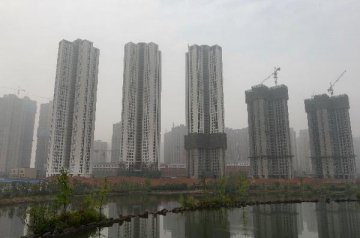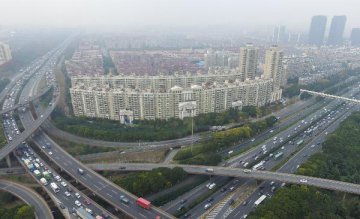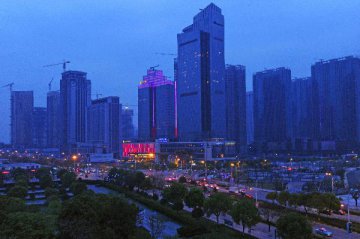
Some places constantly tighten up their regulation policies for the real estate industry in the beginning of 2017. Consequently, the transaction of commercial residential houses experiences large month-on-month decline in many hot cities. Industry insiders remark that the tightening policies work in concert with the proposal of the Central Economic Work Conference on establishing a long-term and effective mechanism in the real estate market, making houses return to its function for living in, and advancing healthy development of the real estate industry. It is expected that the housing price will stay steady or slightly decline on the whole in 2017.
Sluggish start in early 2017
Data shows that in the first week of 2017 (Jan. 2-8), the total floor space transacted in four major first-tier cities which are Beijing, Shanghai, Guangzhou and Shenzhen stood at 760,000 square meters, representing a month-on-month decline of 22 percent and a year-on-year decline of 5 percent. A total floor space of 2.77 million square meters were transacted in some second-tier cities, a month-on-month decline of 22 percent and a slight year-on-year decrease of 1.07 percent.
As of Jan. 12, the floor space of commercial residential houses sold in 30 cities in January reported a year-on-year decline of 13.3 percent, and the figure in first-tier cities, second-tier cities and third-tier cities declined by 4.5 percent, 9.1 percent and 22.9 percent from a year earlier, respectively. Meanwhile, the supply and transaction of land both decreased. The land area purchased by real estate developers in 100 major cities across the country saw a month-on-month decline of 83.8 percent, and the month-on-month decline in first-tier cities, second-tier cities and third-tier cities recorded 82.5 percent, 92.5 percent and 70.2 percent, respectively. The supply of land also sharply decreased from 18.08 million square meters to 6.41 million square meters with no land newly supplied in first-tier cities.
“As market regulation heightens, the sales volume of houses declines widely.” Wen Yang, an analyst with China Minsheng Securities, holds that declining sales of new houses is widely seen in first-tier, second-tier and third-tier cities, the inventory index has climbed and the sales cycle further shortens. The sales of second-hand houses declined in first-tier cities and other cities too.
GF Securities pointed out that affected by the New Year holiday and the real estate companies’ efforts in pushing up their performance in end 2016, the total transaction in the real estate market suffered large month-on-month decline. The month-on-month drop in first-tier and second-tier cities even exceeded 20 percent, and a decline is widely seen in sample cities like Ningbo, Fuzhou, Dalian and Nanchang.
Regulation might further step up
“The changing trend of housing price is relevant with population. The trend of housing price does not look good in the long run”. Li Xunlei, chief economist with Zhongtai Securities, indicates that a negative growth might be seen in 2017 due to declining growth of investment in the development of real estate. The booming real estate market in first-tier and second-tier cities in 2016 was contributed by leverage. Since the base number was high, negative growth might be recorded in 2017. In addition, the Central Economic Work Conference reaffirmed that “houses are to be built for living in, not for speculation”. Therefore, it is expected that the housing price will stay steady or slightly decline in 2017 since various places have vowed to rein in the hiking of housing price.
Wen pointed out that hot cities like Beijing, Shanghai and Changsha recently all rolled out regulation measures aiming at the real estate market, and management will be reinforced from aspects like the ratio of land being used, the sales of projects and the capital supervision. It is possible that efforts made in regulation will further beef up in 2017. Against the backdrop that restrictions over loans and purchasing keep increasing, the sales volume of houses is expected to remain sluggish and the growth of housing price might slow down.
“At present, regulation in hot cities keeps deepening, and home-purchase restrictions have been imposed to 26 cities. Geographically, cities seeing home-purchase restriction have extended from the east to the middle and west part of China. While for the size of cities, the restriction has been expanded from second-tier cities to hot third-tier cities”, Yue Jiadong, analyst with GF Securities, believes that for credit loan policies, some banks in some cities gradually raise the interest rate of loans. Meanwhile, the tightening credit policies in some hot cities have expanded from commercial loans to housing provident fund loans. In the future, the tightening policies will be continued in hot cities and it might even further expand. According to past experience, the tightening of policies exercises obvious negative influence on the transaction of real estate market. It is expected that the real estate industry will see decline of both sales quantity and price in 2017.
Take the second-hand house market in Beijing as an example, Hu Jinghui, vice-president of private consultancy Bacic & 5i5j, remarks that in the beginning of 2016, the real estate market in Beijing embraced a favorable policy environment featured with the launch of new policies in March 30 of 2015 and a slew of policies for reducing interest rate, reserve requirement ratio (RRR) and tax. But in 2017, Beijing is faced with the tightened policies and increased regulation after the new policies launched in Sept. 30 of 2016. Policies were reversed fundamentally within a year. People now hold a completely opposite expectation on the future trend of the real estate industry and the performance of the housing market will change accordingly. The general trend indicates that affected by tightened policies, the second-hand house market in Beijing will experience a decline of both “sales quantity and price” in 2017.
Translated by jennifer Lu























Latest comments